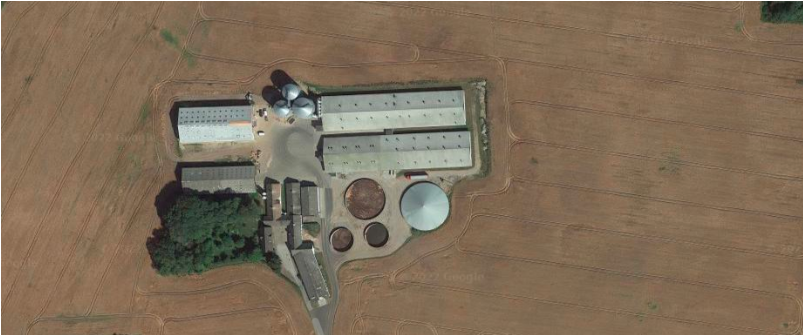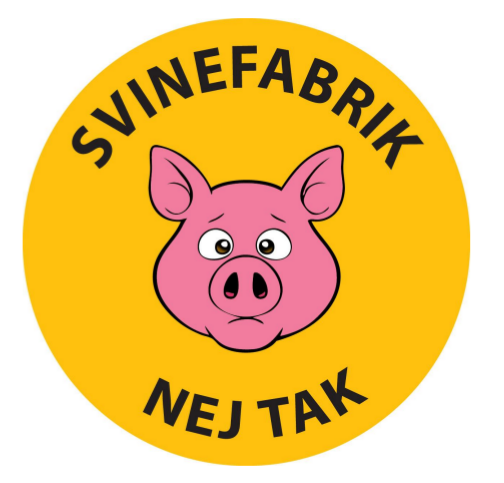- This story is part of a series highlighting local testimonies and collective action against animal factories
Susanne, a retired teacher living in rural Zealand, Denmark, has spent years fighting the negative impacts of a nearby pig factory on her home, community and environment. She and her husband moved to their small, pesticide-free homestead in 1991 to enjoy a peaceful life close to nature. However, shortly after their arrival, the local pig factory expanded significantly, bringing with it numerous challenges that have since sparked their resistance and activism.
Life near the pig factory
The nearest pig factory is just 100 meters away from their home, with other large installations scattered across the region. Over the past 15 years, these factories have continued to grow, leading to severe issues with pollution, traffic, and a pervasive, unbearable stench.
“The smell isn’t just during manure spreading; it’s constant,” Susanne says. “For weeks or even months, we can’t go outside or enjoy nature, and the odour sometimes drifts into our house.”
During warmer months, the factory’s ventilation fans run more frequently, intensifying the smell. While wind direction occasionally offers some relief, it means their neighbours suffer instead.
The pollution extends beyond odours. Local “Swine Barons” use heavy pesticide spraying to grow animal feed, which, along with manure dumping, creates hazardous conditions.
“The slurry mists drift far away, even over the nearest towns, even inside the vegetable departments of local supermarkets,”
she explains. The couple has also experienced regular heavy traffic with trucks spilling animal waste on roads without cleaning up. This constant pollution has not only affected their health but also damaged their peaceful, rural lifestyle.

Health impacts
Living so close to a pig factory has taken a toll on Susanne’s and her community’s health. The air is filled with over 200 toxic substances, including hydrogen sulfide, a gas as dangerous as cyanide. The Danish Working Environment Authority even described it as “a very dangerous poison for humans and animals.”
“When it stinks here, I and others in the area suffer from headaches, nausea, malaise and mood swings,”
she shares. Despite the evident health risks, local authorities have been slow to act.
Impact on property and community life
The presence of the pig factories has affected the value of their home and their community. Potential home-buyers are often unaware of the conditions before purchasing properties in the area, only to be shocked by the reality of the smell and pollution once they move in.
Socially, the stench has disrupted Susanne’s social life.
“It’s not nice and cozy to have guests in the slurry tank,” she says. “We can’t sit outside or enjoy the garden and enjoy a cup of coffee in the sun with guests.”
Despite these challenges, Susanne has found solidarity through activism, developing strong friendships with others who face similar struggles.
Resistance and activism
Frustrated with the lack of action from local authorities, Susanne turned to environmental activism, joining groups like the National Association Against Pig Factories.
“The first years we lived here, we didn’t realise that many others were also affected by the pig industry. We felt very alone. But over time, we’ve realised that our problems are not unique,”
she explains. Building networks with others who are facing the same challenges has helped them provide support to one another, share experiences, and advocate for stronger environmental regulations.
Their fight is ongoing.
“We’ve filed numerous complaints about the factory, but the municipality rarely takes action. Farmers here often violate environmental regulations, and yet, they face no real consequences,”
Susanne says. She believes the local agricultural department behaves more like a farmers’ association, focusing on protecting industrial interests over public health and environmental safety.

Political inaction
Susanne has found some political support, but she says it’s not enough.
“Some politicians understand and try to help us, but they can’t seem to get through to the administration,”
she explains. Livestock farming legislation in Denmark is complex, and it’s hard for even sympathetic politicians to navigate the system and break through the ‘swine barons’ influence.
“Consideration for the pig industry is prioritised over people and environment. Politicians are largely shaping legislation according to the wishes and demands of the swine barons,” Susanne adds. “This is completely wrong. Considering how many billions industrial agriculture receives from the EU and the Danish treasury in direct and indirect subsidies every year, it’s disheartening and embarrassing to see how important laws remain beyond logic and reason.”
Despite the increasing attention from environmental groups, doctors, and researchers, little political progress has been made. Susanne points out that the International Monetary Fund (IMF) even recommended in 2020 that Denmark should halve its livestock population for the sake of biodiversity and public health.
“If pig factories were regulated under the Environmental Protection Act like any other industry, they would have been closed down a long time ago for their harmful emissions,” she argues.
Challenges of speaking out
Taking a stand against the pig factories has come at a personal cost. Some farmers have resorted to threats and vandalism.
“It’s not good for a village community, it creates discord. I myself have been subjected to unpleasant behaviour from farmers,” she reveals. “Some people get scared and keep a low profile, and that’s exactly the point.”
Susanne says the biggest barrier to becoming more active in resisting these projects is the lack of understanding from people outside rural areas.
“They don’t believe how bad the smell and pollution are. Some people tell us to just sell the house and move, but where would we go? There’s no guarantee we wouldn’t end up next to another pig factory,”
she laments.
The path forward
Despite the obstacles, Susanne remains hopeful for change.
“I hope that the politicians in the Danish Parliament will one day follow the IMF’s recommendations and that pig factories will be categorised as industry,” she says. “We won’t have better biodiversity and a cleaner country until farmers are no longer allowed to produce as intensively as they do today.”
Susanne calls for stronger laws regulating animal factories, and to properly hold municipalities accountable for failing to enforce existing legislation and fulfil their obligations.
“The management of the agricultural sector needs to be examined and politicians must find the courage to be open about decisions and to take responsibility for nature and citizens,” she says.
—–
Living near a pig factory has severely impacted Susanne’s health, home, and way of life. Despite these difficulties, she continues to fight for stronger environmental regulations, advocating for a future where rural communities and nature are prioritised over industrial agriculture and the interests of a few. While the battle is long and difficult, Susanne’s resilience and commitment to environmental activism offer a powerful example of local resistance.







